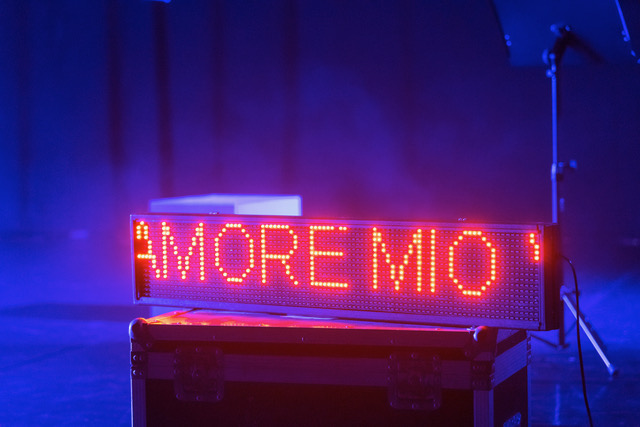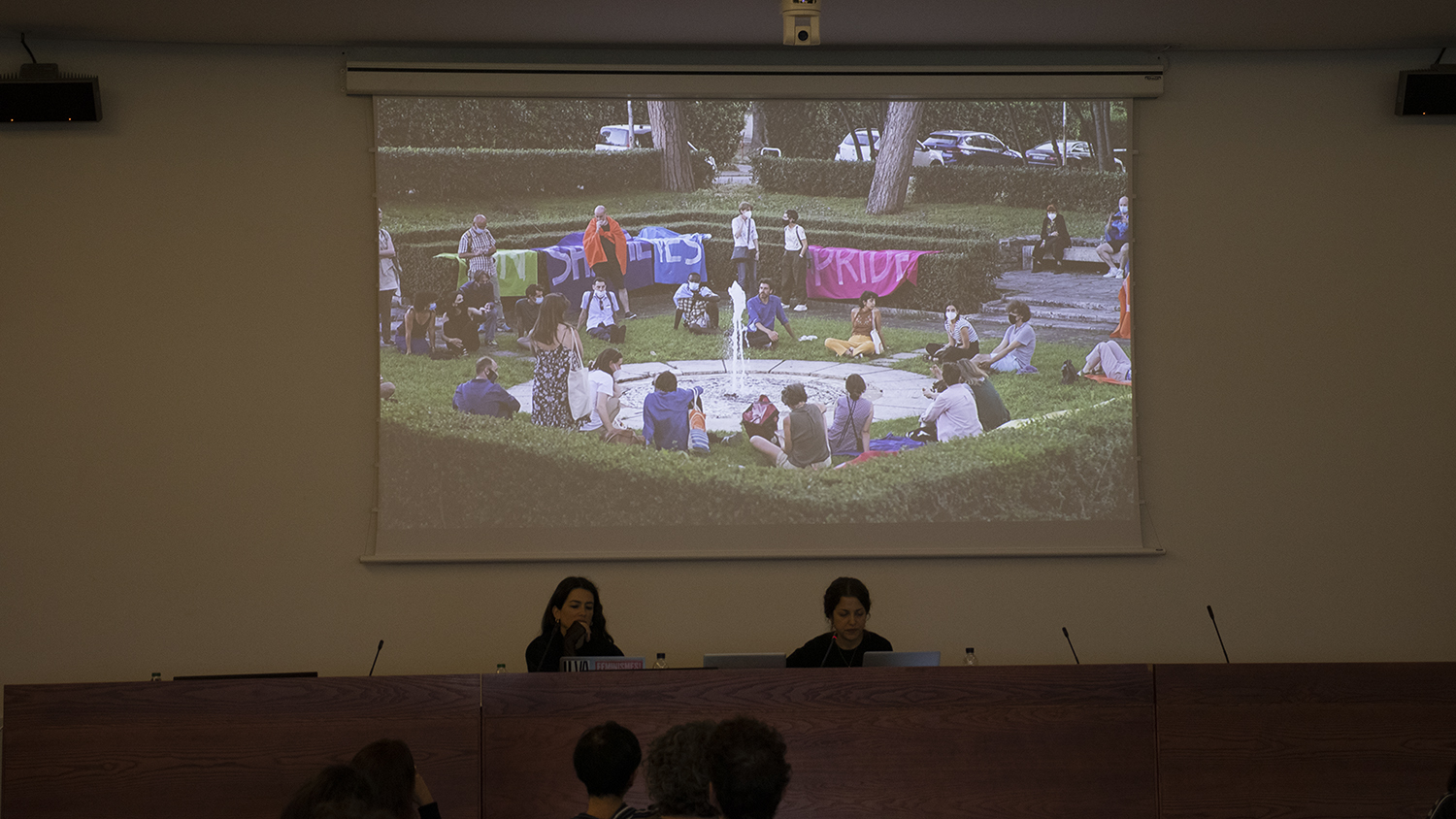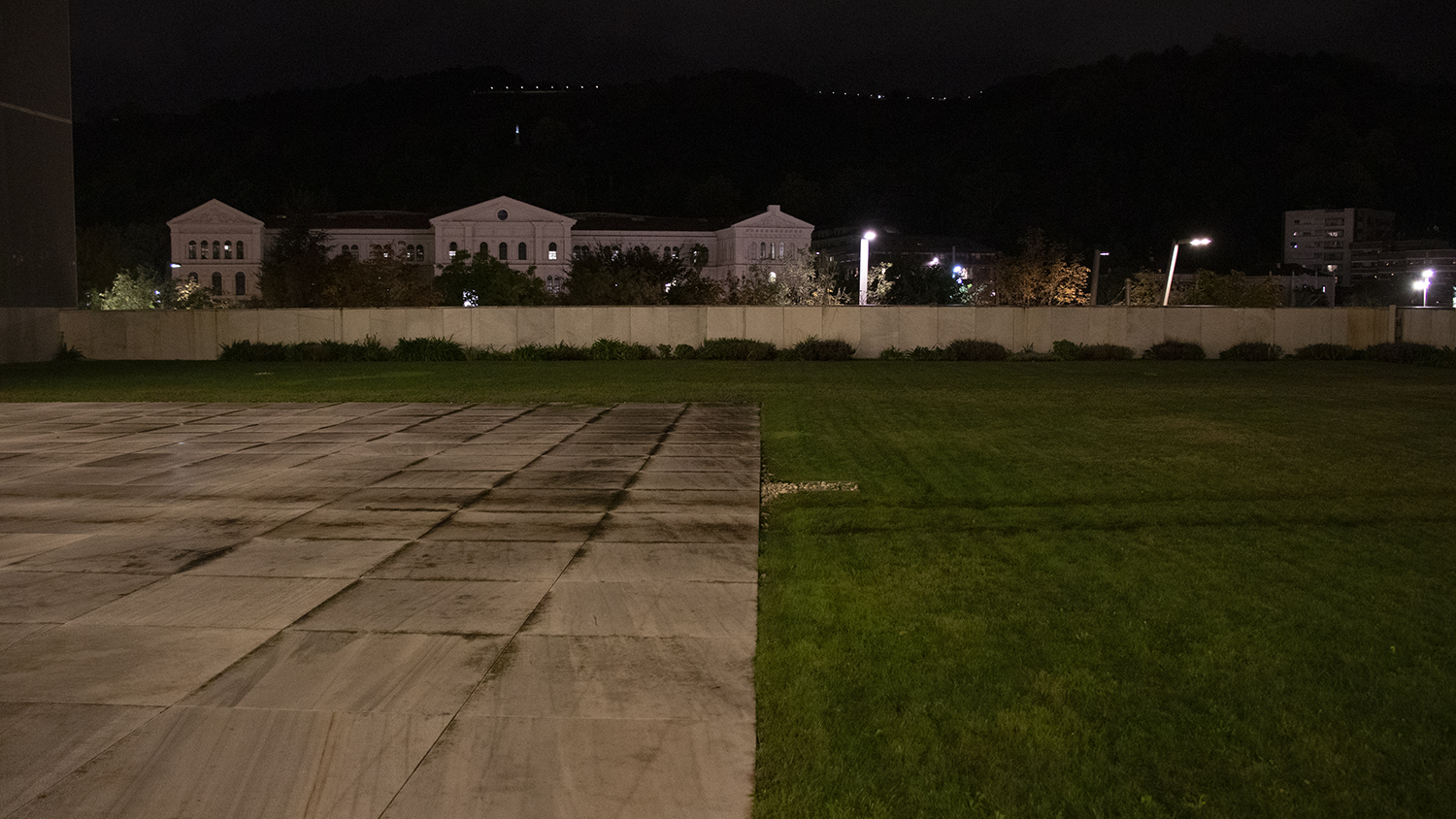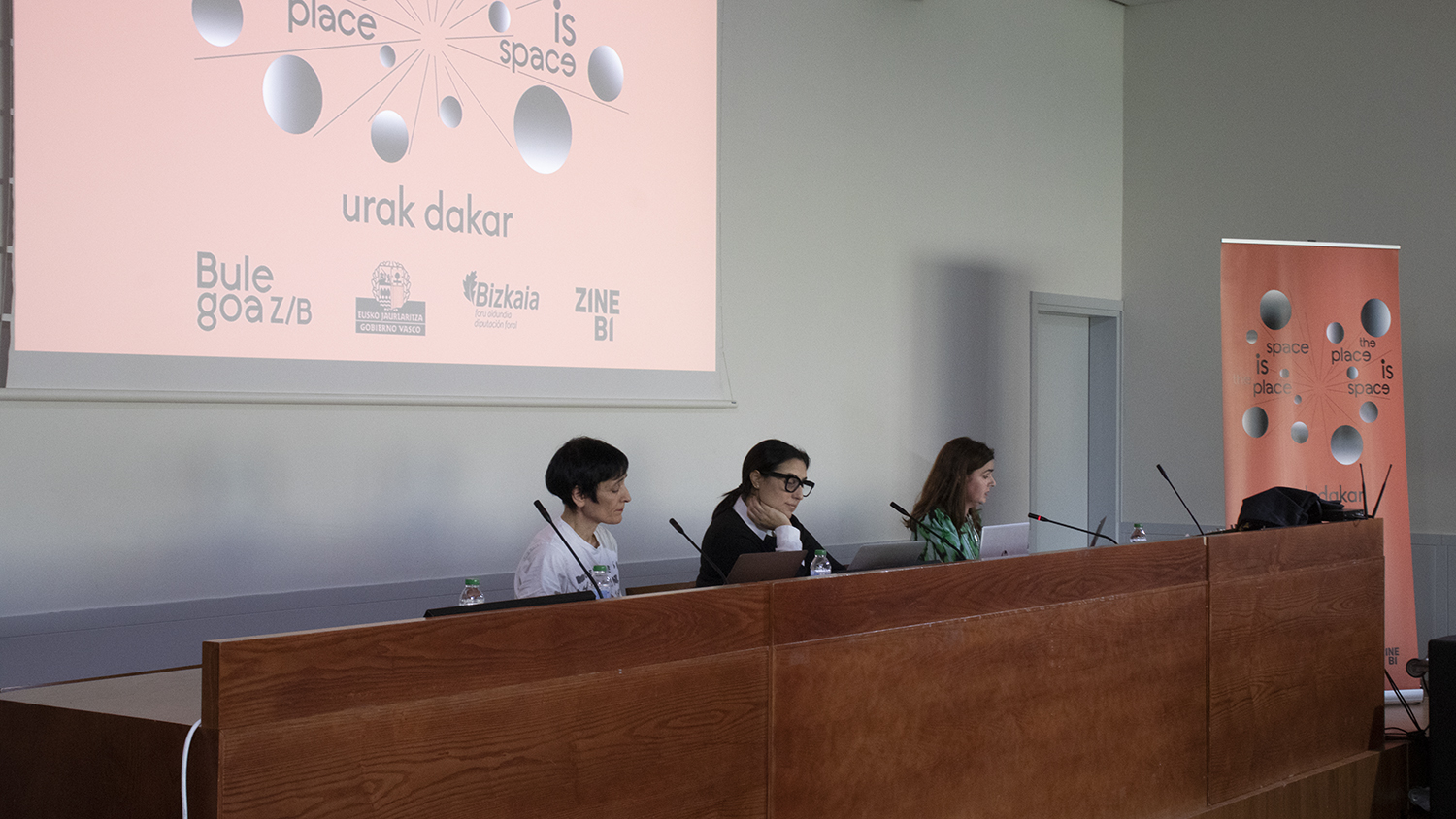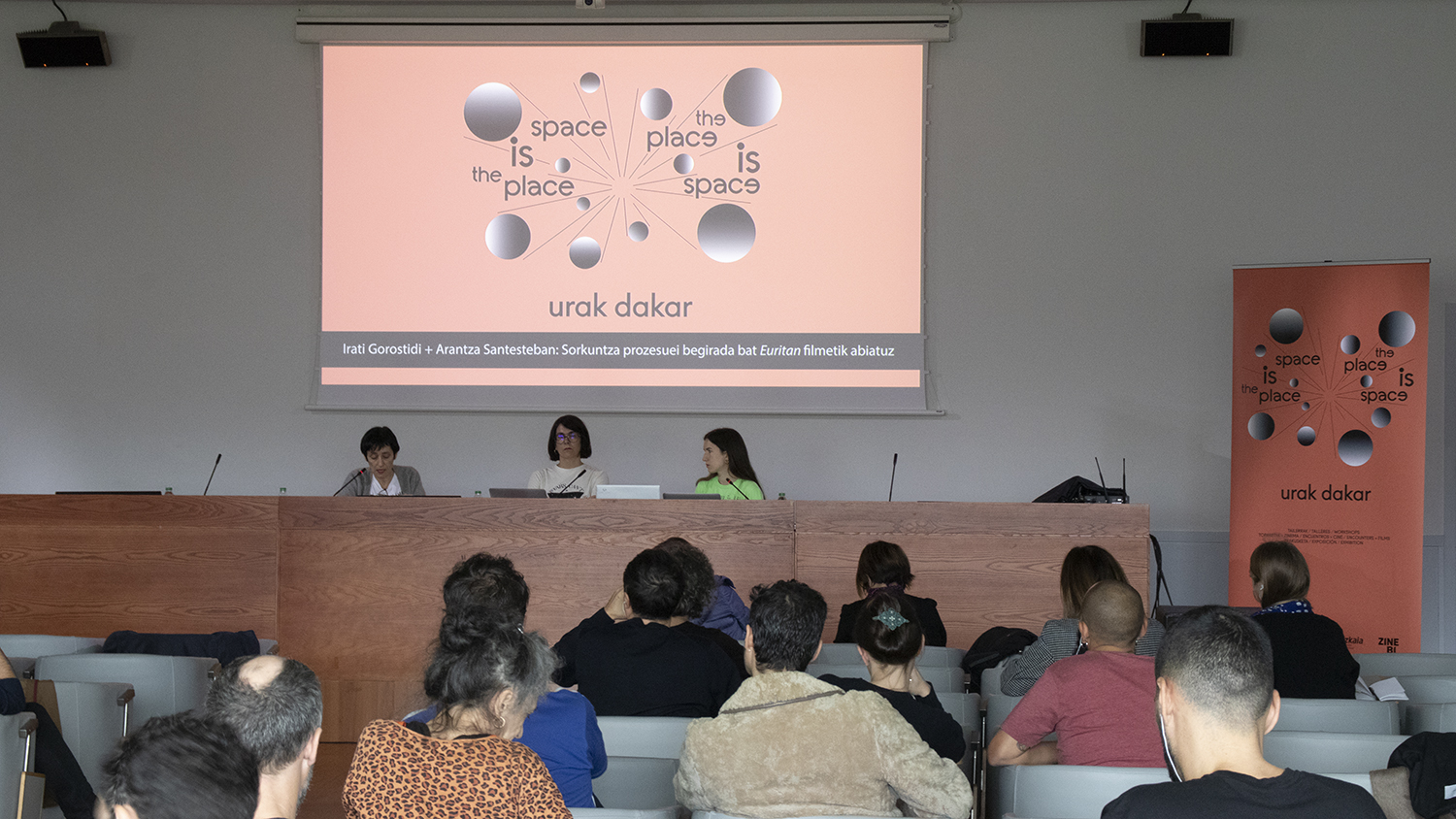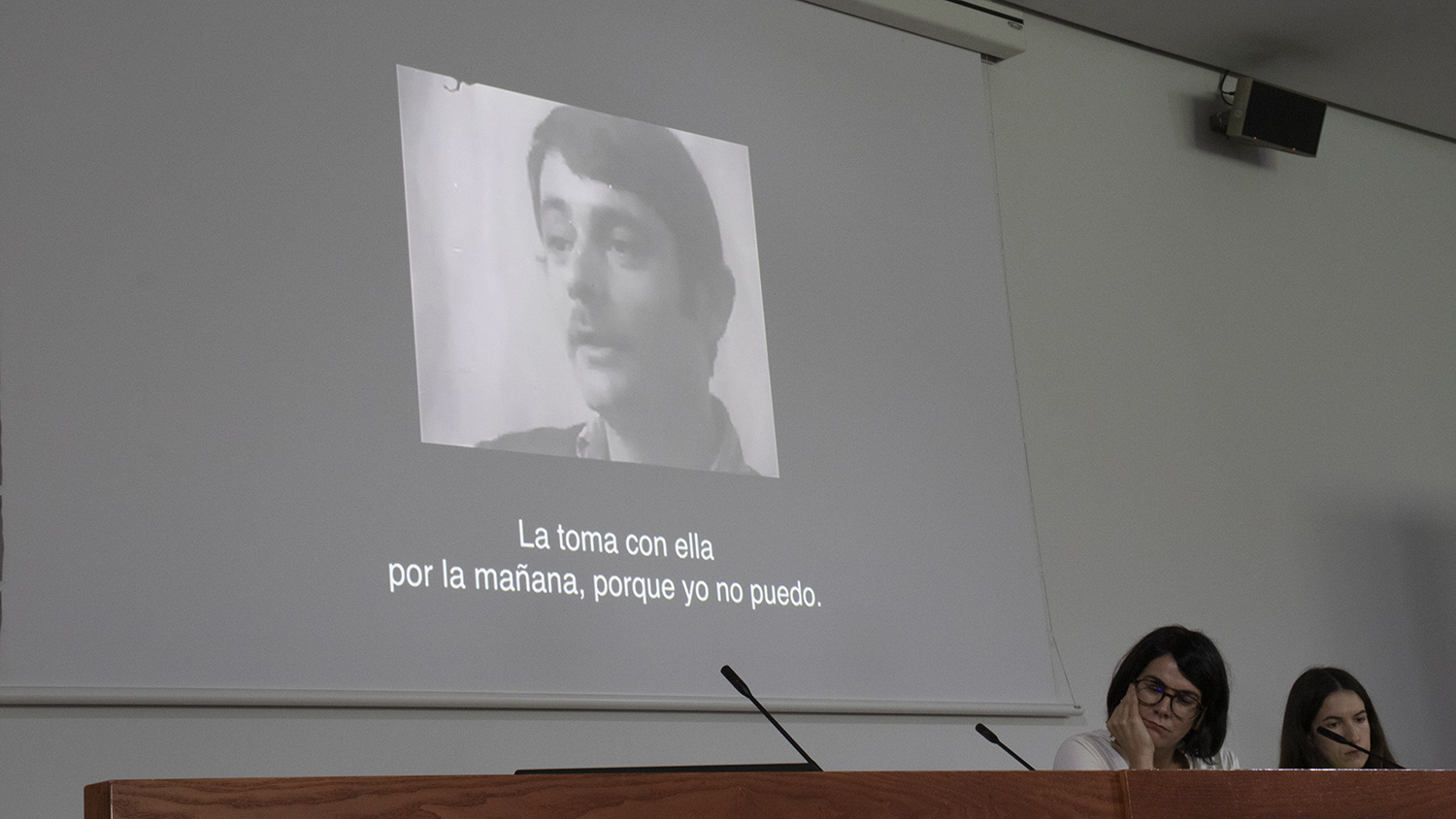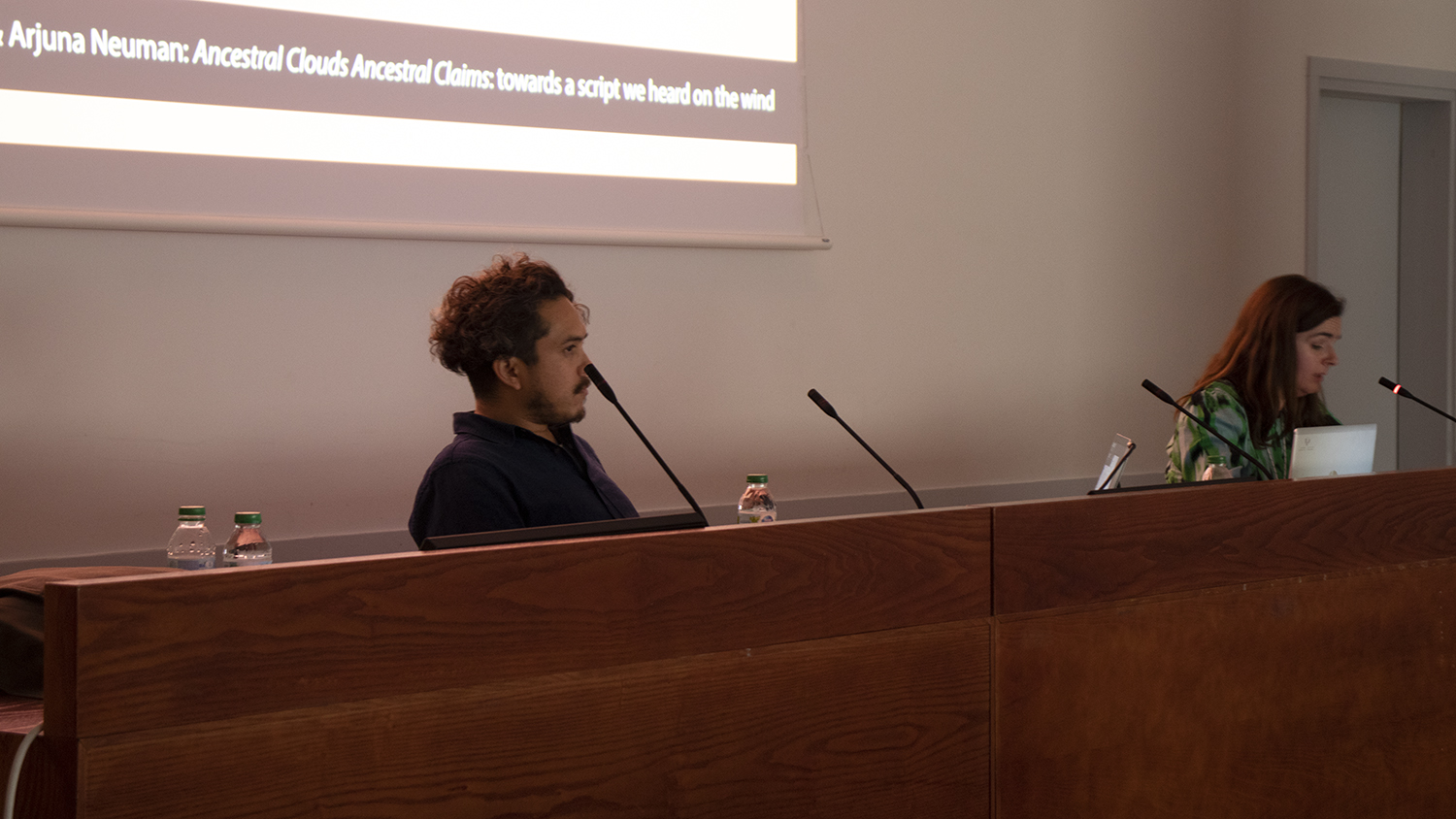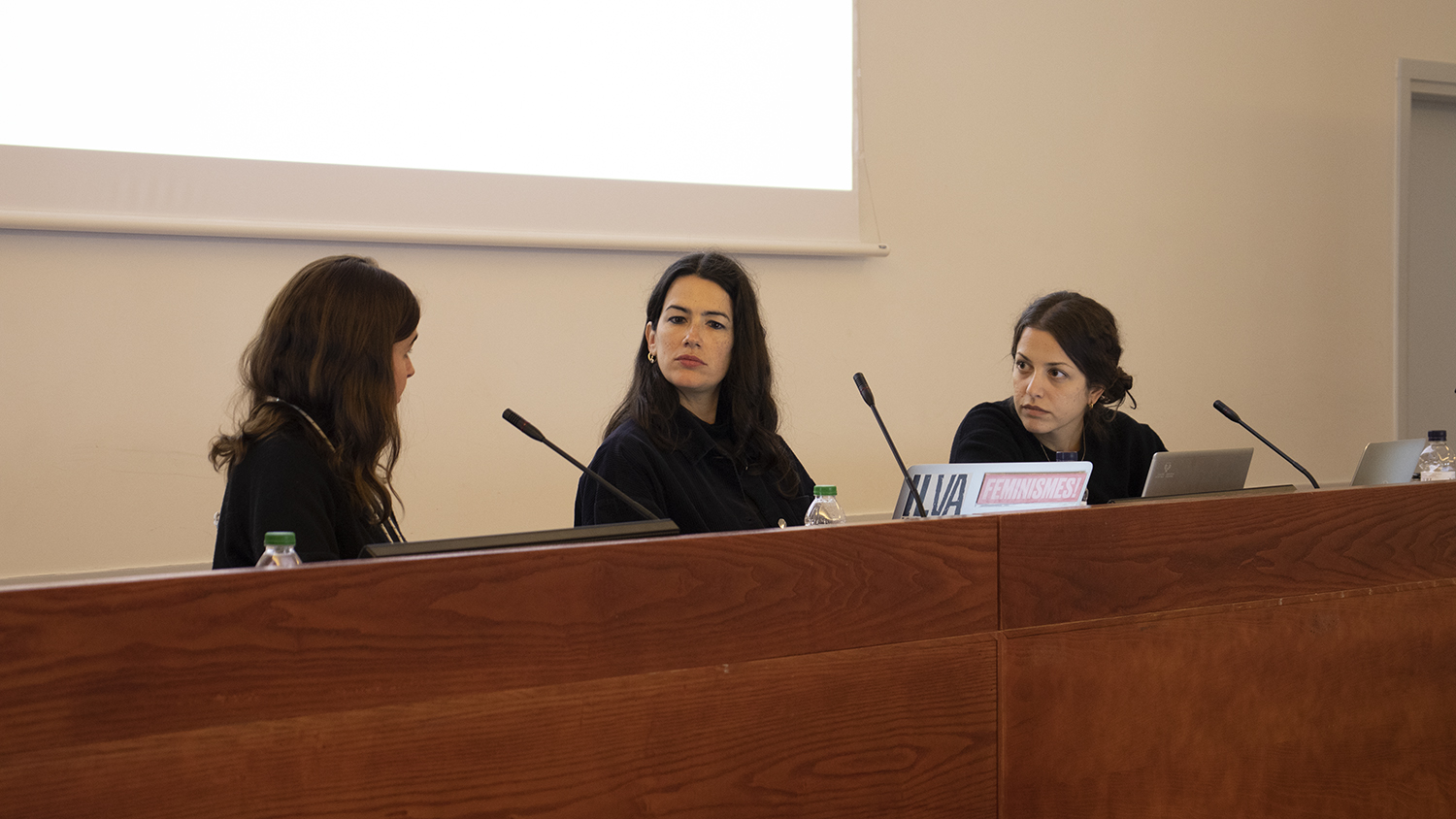Urak dakar - Encounters
URAK DAKAR. ENCOUNTERS
by
Urak dakar encounters. Two days of conferences and performances for thinking in situ, in space and about the place.
DATES
2022/11/18-2022/11/19
VENUE
Bizkaia Aretoa-UPV/EHU
Mikel Laboa & Pío Baroja
Abandoibarra 3
48009-Bilbao
Conferences will be streamed.
Simultaneous translation into Basque, English and Spanish will be provided.
PROGRAMME
Friday, November 18
Talks
10:00 am: Introduction
10:30 am: Kodwo Eshun & Louis Henderson: Thinking Dub Cinema: Handsworth Songs in, as and with Dub
11:30 am: Irati Gorostidi & Arantza Santesteban: A look at creative processes through Euritan
12:30 pm: Coffee break
1:00 pm: Denise Ferreira da Silva & Arjuna Neuman: Ancestral Clouds Ancestral Claims: towards a script we heard on the wind
Performances
6:00 pm: Josu Bilbao: askiè altu
7:00 pm: Sofía Montenegro: Venir y ver
Saturday, November 19
Talks
10:00 am: Introduction
10:30 am: Pablo La Parra: Back from the shout. Meeting Helena Lumbreras
11:30 am: Rachel Weiss: Living in the Wake of a Missing Past: The Trauma of 1973 in Chile and Patricio Guzmán’s Project of Reclamation
12:30 pm: Coffee break
1:00 pm: LOCALES (Sara Alberani & Marta Federici): Hidden Histories: del peligro de la historia única
Performances
6:00 pm: Itziar Okariz: Bilbao
7:00 pm: Giulia Crispiani & Patrizia Rotonda: Scongiuro
URAK DAKAR. ENCOUNTERS
Urak dakar (Water carries) is the new edition of the Bulegoa z/b programme Space is the Place / The Place is Space. Begun in 2018, the program title paraphrases the 1974 Afro-futurist film by Sun Ra.
The encounters are comprised of a series of talks and performances that will take place on 18-19 November at Bizkaia Aretoa-UPV/EHU. A film programme hosted by the Zinebi 64 film festival will be presented on 16 November at the Auditorium of the Guggenheim Bilbao Museum. The autumn programme of Urak dakar takes its inspiration from the Afrofuturist strategy of using fiction as a tool to disrupt temporalities to make way for new readings of history.
The encounters and film programme tackle issues such as the structural violence of capitalism and its colonial past, or the potential of memory and collective action. Both events will take place at Abandoibarra, an urban area whose industrial past has been erased and substituted for the shining surfaces of new buildings. We wanted to make the most of this circumstance to try to think in situ, in the space and about the place.
TALKS
Kodwo Eshun & Louis Henderson: Thinking Dub Cinema: Handsworth Songs in, as and with Dub
Kodwo Eshun and Louis Henderson have been in conversation about the film Handsworth Songs since 2015, resulting in various public presentations, workshops and a seminar at the Dutch Art Institute. In two separate presentations, Eshun and Henderson will discuss the role that the Black Audio Film Collective played in the advent of a black industrial postpunk culture in the UK in the 1980s, bringing the film and its sound/image tracks into relation with the music of groups such as Throbbing Gristle, Jah Shaka, The Pop Group and Steel Pulse. Eshun and Henderson will think through Handsworth Songs as a form of dub cinema that brings together industrial and dub processes in a montage made in resistance to the racist police state of Margaret Thatcher’s Britain.
Irati Gorostidi & Arantza Santesteban: A look at creative processes through Euritan
This presentation will be structured around the process of making Euritan and will work through our various creative stages, the doubts that arose and the decisions we made. Euritan came about as a result of a commission from Pablo La Parra in which he invited us to reflect on the research he was doing on film practices sparked by May 68 and the reflection of these in today’s context. We then improvised our making of the film as a dialogue between the two of us. We started by watching and researching films together. We chose the films freely by focusing on militancy and its representation. In our talk we will use a selection of film extracts used in the making of our own film.
Denise Ferreira da Silva & Arjuna Neuman: Ancestral Clouds Ancestral Claims: towards a script we heard on the wind
We will read from the script that we are developing for our new film: Ancestral Clouds Ancestral Claims. Continuing our research into the elements, into elemental cinema, and the possibility for thinking and being otherwise – we invite you to listen to the wind with us. And to the poems, ideas, fragments, sounds and phrases, to the dust, moisture, sand, seeds and biological matter that the wind carries, that the wind is made from (ancestors by another name). We ask, what, or rather who, does the wind make possible?
Pablo La Parra Pérez: Back from the shout. Meeting Helena Lumbreras
Many of the most important forces that went into shaping the “long 68” converge in the trajectory of Helena Lumbreras: from the radical Italian left, to anti-Francoist dissidence, to the workers’ movement and feminism; from conventional film education to the utopia of militant cinema. From 1968 to 1978, often under the name of Colectivo de Cine de Clase, Lumbreras directed six different films and several unfinished projects that map out popular struggles during the late Franco era and Spanish transition. Her works are the traces of experiences erased by neoliberalism: peasant farmers rising from the ground, the struggles of factories, politicised female housekeepers. How to meet these images and sounds in the present day, when we are separated from them by an abyss of history, politics and technology?
Rachel Weiss: Living in the Wake of a Missing Past: The Trauma of 1973 in Chile and Patricio Guzmán’s Project of Reclamation
The 1973 coup that ousted Salvador Allende from the presidency of Chile ushered in a long period of enforced forgetting, during which the radical experiment of Allende’s Unidad Popular government was mostly consigned to oblivion. The filmmaker Patricio Guzmán has dedicated himself to telling the difficult histories that the country has lived, in a cycle of films that become increasingly personal over the decades. This essay explores the affective and aesthetic languages he has used in that journey.
LOCALES (Sara Alberani & Marta Federici): Hidden Histories: about the danger of a single story
The presentation will introduce Hidden Histories, a project set up by LOCALES in 2020 and designed as a platform for site-specific research and artistic production. Hidden Histories aims to consider the cultural and historical heritage of Rome from a decolonial perspective. Through the practices and discourses of the artists involved, the public programme opens up paths of reappropriation and re-signification of places in the city from which communities have been displaced. The works and actions presented detect and analyse processes of invisibilization and track down marginalized stories and voices in order to call them up into public space. Curators Sara Alberani and Marta Federici will retrace the evolution of the project across the past three years, analysing the methodologies and strategies adopted.
PERFORMANCES
Josu Bilbao: askiè altu
“Speaking to the place, a happening of language. One too high to reach. Knowing itself to be inaccessible. Light in spite of its heavy aspect. It hangs, or pends, vertically, prescisely the reverse of the horizon. More like an anchorage, it rises rather than going down, it raises your gaze. Tilting your head backwards. And when you do, it’s the ceiling, a tongue meant to feed but too high”. (Note by Isabel de Naverán on the exhibition askiè altu. ethall, Hospitalet, 2022)
Soundtrack: Estanis Comella.
Sofía Montenegro: Venir y ver
Venir y ver (Come and See) is a listening session bringing together exercises in sound carried out in different places. Between dawn and the shadows, on the coast, at the estuary, by a river. At 21:50 the sun goes down and the crickets start chirping. A bird arrives at 6:40, just before the rubbish collectors. This is the first car of the day. In the background we hear a cockerel, fading with the first lights. A magenta outline shines in the distance, and the temperature rises by two degrees. Quite a few things are happening at the same time.
Itziar Okariz: Bilbao
(Audio transcription, monologue) Testing (inhales), great, let’s see, eeh…it’s, we’re at La Peña, this is La Peña, we’re hummm, in the parking lot by La Peña football field. (Sound of traffic, cars passing not too far away, silence). There are some people in a car (silence, swallows, speech accelerates), at this place next to La Peña, in this place at La Peña. We were here once, eeeeeh… three people… four, with a baby, in the place, where that white car is parked, where those five are, young guys, in the car. They’ve just got in because it’s really cold… (Silence, pause) In this place, we were recording an… an action, photographing an action, recording an action (inhales), aaat night a few years ago. This parking lot, it’s alwaays… nearly empty (Sound of car passing).
Performers: Leire Aranberri, Itziar Okariz, Kristina Ortiz.
(The artist showed different materials from the Bilbao (2007-2008) series during the second session of Itziar Okariz: Working with material. This study group is led by Elías Querejeta Zine Eskola with the support of a projects grant from KsiGune.)
Giulia Crispiani & Patrizia Rotonda: Scongiuro
Scongiuro is a formula meant to be passed from mouth to mouth, which works like a chant – or a kind of prayer, or a spell to remove another that has been cast upon places and histories. Sometimes it is a mourning ritual, sometimes a love letter. It always comes in between the spaces of correspondence – at a distance. Scongiuro is a call for spirits, believers and protesters to join in to a lament. It switches language and mood because it always lands in a different time, and it can be carried by the wind and by those who wish to.
This version of Scongiuro is a libretto given to Patrizia Rotonda by Giulia Crispiani to take from Rome to Bilbao and transform into a voice for other bodies.
Basque and Spanish versions of the libretto by Irene Hurtado de Saratxo Mendieta.
BIOS
Dr. Kodwo Eshun is a filmmaker, theorist and artist, based in London and Berlin. He is Lecturer in Contemporary Art Theory at Goldsmiths, Department of Visual Cultures, University of London and Professor of Visual Arts at Haut Ecole d’Art et Design, Genève. In 2002, he founded The Otolith Group together with Anjalika Sagar. Their essayistic approach reflects on science fiction as a political practice of the present through video, films, text and sound related to post-liberation media archives of the Global South. Kodwo Eshun is author of More Brilliant than the Sun: Adventures in Sonic Fiction (forthcoming from Verso, 2022) and Dan Graham: Rock My Religion (Afterall, 2012).
Louis Henderson is a filmmaker and writer who experiments with different ways of working with people to address and question our current global condition defined by racial capitalism and ever-present histories of the European colonial project. His films and installations have been shown in various international film festivals, art museums and biennials and are distributed by LUX and Video Data Bank. His writing has been published in both print and online in books and journals. He is a doctoral candidate at the École Nationale Supérieure d’Arts de Paris-Cergy, his research looks into the riverscapes of the East of England and Guyana through “spiral retellings” of the works of Wilson Harris and Nigel Henderson.
Irati Gorostidi Agirretxe (Eguesibar, 1988) is a filmmaker, currently working on her first feature film, Anekumen, selected by the SSIFF Ikusmira Berriak programme and ECAM Start Me Up, among other mentoring and market programmes. Her short film Contadores was selected for Kimuak 2022, and her project San Simón 62 was the winner of X Films, Festival Punto de Vista 2021; it premiered at the latest edition of the festival and was included in the Navarra Shortzinema catalogue. Her films have been screened at festivals internationally. She studied art and film and has been a Fulbright Scholar in New York.
Arantza Santesteban Perez (Iruña, 1979) is a historian, filmmaker and independent researcher. After completing a Degree in History at the Universidad del País Vasco, she went on to study audiovisual arts, with a Diploma in Creative Documentary making at the Francesca Bonnemaison centre, Barcelona. She is the director of several films including Passatgeres (2012), Euritan (2017), 918 GAU (2021) and Liluraren kontra (2021), and is currently reading her PhD at the Lisbon University of Fine Arts with Susana de Sousa Dias and Ana Longoni, researching themes relating filmic representation to feminism and the Basque political conflict.
Denise Ferreira da Silva is an academic and practicing artist. She is the author of Toward a Global Idea of Race (2007) and Unpayable Debt (2021) and co-editor (with Paula Chakravartty) of Race, Empire, and the Crisis of the Subprime (2013) and (with Mark Harris) of Indigenous Peoples and the Law (Routledge, 2018). Her artistic works includes the films Serpent Rain (2016), 4Waters-Deep Implicancy (2018), Soot Breath/Corpus Infinitum (2020), in collaboration with Arjuna Neuman; and the relational art practices Poethical Readings and Sensing Salon, in collaboration with Valentina Desideri.
Arjuna Neuman is an artist, filmmaker and writer, with recent presentations at CCA Glasgow; Centre Pompidou, Paris; Manifesta 10, Marseille; Showroom Gallery, London; TPW Gallery, Toronto; Forum Expanded, Berlin Berlinale; Jameel Art Centre, Dubai; Berlin Biennial 10, Germany; Serpentine, London; X Qalandia Biennial, Palestine; Gasworks, London; Bold Tendencies, London, UK; Or Gallery, Vancouver; Whitechapel Gallery, London; and Istanbul Modern, Turkey amongst others. As a writer, he has published essays in Relief Press, Into the Pines Press, The Journal for New Writing, VIA Magazine, Concord, Art Voices, Flaunt, LEAP, Hearings and e-flux.
Pablo La Parra Pérez is professor in charge of the research department at Elías Quejereta Zine Eskola. He currently directs the archive project Zinemaldia 70: todas las historias posibles set up by the San Sebastian Film Festival and EQZE. Having obtained his PhD with the New York University, he is a specialist in militant film cultures of the sixties and seventies. His academic work has been published in international magazines such as the Journal of Spanish Cultural Studies; Sociologias; and books such as Global Perspectives on Amateur Film Histories and Cultures (2020); 1968 and Global Cinema (2018); and other works.
Rachel Weiss. Writer, educator, and lapsed curator, Professor Emerita at the School of the Art Institute of Chicago. Major publications include Making Art Global: The Third Havana Biennial (Afterall Books), To and From Utopia in the New Cuban Art (University of Minnesota Press). Major curatorial projects include Global Conceptualism 1950s-1980s: Points of Origin (Queens Museum of Art, NYC: co-director with Luis Camnitzer and Jane Farver), Ante América (Biblioteca Luis Ángel Arango, Bogotá: co-curator, with Gerardo Mosquera and Carolina Ponce de León). Her most recent book is Now What? Quandaries of Art and the Radical Past (Fordham University Press).
LOCALES is a curatorial platform founded in Rome by Sara Alberani and Valerio Del Baglivo—later joined by Marta Federici—that aims to inspire critical reflection on the public sphere through artistic practices. Starting from the political and social history of the cities and communities encountered, LOCALES develops site-specific programs involving the production of new artworks, performances, collaborative learning activities, and explorations of public space.
Sara Alberani is an art historian and independent curator. She expresses her curatorial research in socially engaged art practices concerning communities and public spaces, focusing on long-term projects such as Trampoline House (documenta fifteen) and LOCALES.
Marta Federici is an art historian and curator. Besides LOCALES, she is part of the curatorial team that runs the independent art space Lateral Roma and works as assistant curator at MACTE Museum, Termoli (IT).
Josu Bilbao. Artist. He draws from the persistent orality and speech of some endangered languages to expand and depart towards sculpture as a sensitive and material practice that produces sensory and physical spatiality. Observing both phases as preambles of formalisation and agreement, as pre-linguistic potential for future forms, nourishes a continuous doing that the exhibition arranges through ephemeral ecosystems or acts, sustained by care and listening closely to the inherent processes.
Sofía Montenegro studied Fine Art and Cultural Studies in Utrecht and Madrid, and did an MA in Art Praxis with the Dutch Art Institute. Her practice incorporates different methodologies that link sight, sound and action in space, seeking ways to produce images in thought. Her works are realised as sound itineraries, installation, collective encounters, listening sessions or performance. She is currently a resident at BilbaoArte. Montenegro was one of the winning artists in Generación 2022 and has shared her work at MNCARS, LCE, El Chico, CA2M, Hablar en Arte, Hangar, La Escocesa and other places.
Itziar Okariz is an artist. Her work is characterised by the production of actions that question norms governing language and the production of signs that defines us as subjects. Solo exhibitions and performances include: Las estatuas, Museo Fundación Oteiza (2021); Shanghai Biennale (2020); Perforated by, with Sergio Prego, Spanish Pavilion, 58 Venice Biennale (2019), Respiración y otros sonidos, Centre d’art la Panera, Lleida (2018). In 2022 she published Sueños (Dreams, Caniche editorial, Bilbao).
Giulia Crispiani is a writer and visual artist based in Rome, where she is an editor for NERO Editions. Her work has been presented at, among others, Center for Book Arts, New York and Almanac Inn, Torino. She is the author of Incontri in luoghi straordinari / Meetings at remarkable places (Nero Editions, 2020), What if Every Farewell Would Be Followed by a Love Letter (Union Editions, 2020) and What if I can’t say goodbye (Union Editions, 2021), and co-author of غم/Tristezza/Sorrow (Oreri, 2021) and Albe e tramonti di Praiano* (Oreri, 2022).
Patrizia Rotonda is a singer and composer. She is a performer and improviser in several fields of contemporary art. For several years she has deepened her research on polyvocality and oral tradition. She has collaborated with various artists, participating in shows and art events including Caterpillar Radio 2, Live Radiotresuite and live Kataweb. Rotonda is a member of Giovanna Marini’s Quartetto Nuovo. She has sung contemporary and popular music in several ensembles. In 2014 and 2016, she was the soloist voice in William Kentridge and Philip Miller’s Triumphs and Laments.
Urak dakar is supported by the Basque Government, Diputación Foral de Bizkaia and Zinebi 64.
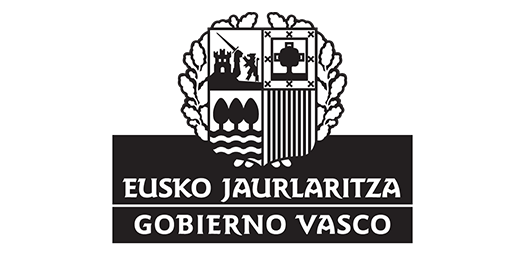

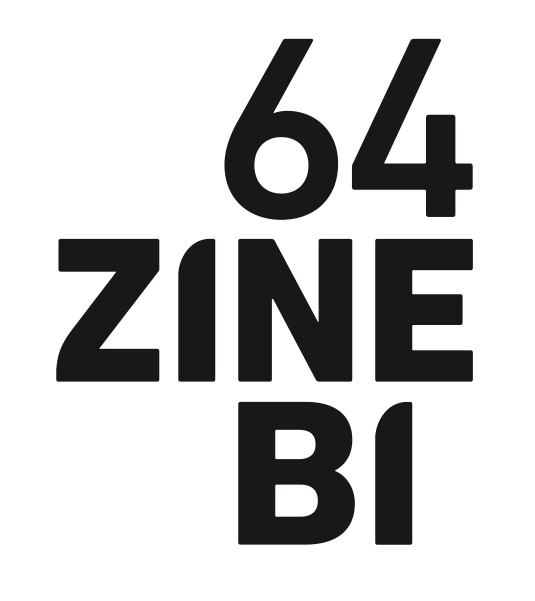
REGISTRATION
Please, fill out the following form:

